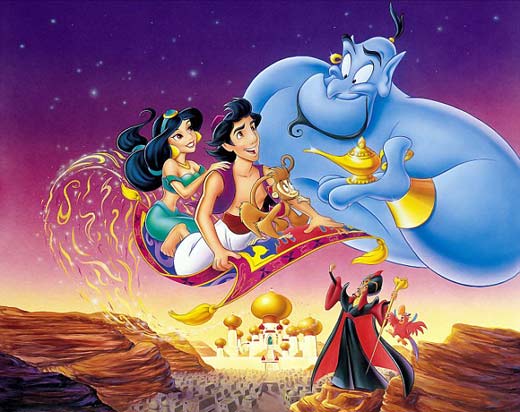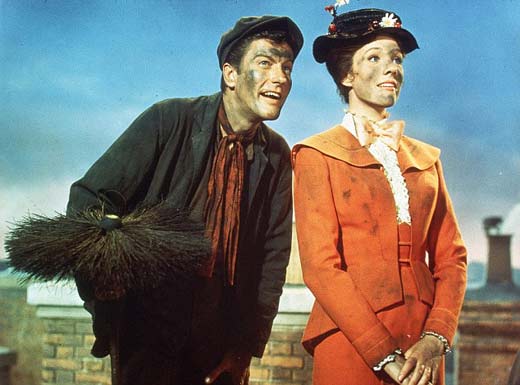當(dāng)前位置: Language Tips> 雙語新聞
Grumpy's too happy! Disney characters mask the misery of working class life, say academics
分享到

They are the children’s film characters loved by generations of fans, rich or poor, across the world.
他們是兒童電影中的角色,深受世界各地一代又一代人的喜愛,無論是富有還是貧窮。
But the Seven Dwarfs, Bert the chimney sweep in Mary Poppins and others have been criticised for sending out the wrong message about poverty.
但是有人批評七個小矮人和《歡樂滿人間》中的掃煙囪者伯特等角色就窮人方面?zhèn)鬟_(dá)了錯誤信息。
Good-natured Bert, played by Dick Van Dyke, is too happy and carefree given the hardships of working-class life in Edwardian London, US researchers claim.
美國研究人員指出,迪克·范·戴克飾演的和藹的伯特,在愛德華時期倫敦工人的貧苦生活條件下,未免表現(xiàn)得太過快樂和無憂無慮。
And the Seven Dwarfs – even Grumpy – would not be singing cheerfully at the prospect of working all day in a mine.
七個小矮人,包括“壞脾氣”小矮人,日復(fù)一日在礦場挖礦,他們根本做不到開心地唱歌。
Other Disney movies, including Aladdin, The Lion King and 101 Dalmatians were also criticised for making poverty appear benign and climbing the class ladder seem an easy thing to do.
還有《阿拉丁神燈》、《獅子王》和《101只斑點(diǎn)狗》等迪士尼動畫片也受到了指責(zé):這些電影將貧困的生活輕描淡寫,窮人似乎不費(fèi)吹灰之力就能成為上層階級。
Researchers from Duke University in North Carolina looked at 32 films, many of them from Disney, that were rated G – the American equivalent of U – and had grossed more than $100million (£68million) worldwide. They put the characters into classes based on their job. At the top are upper class characters – royalty, chief executives and celebrities.
來自加利福尼亞北部杜克大學(xué)的研究人員觀看了32部影片,大部分出自迪士尼,級別為G(在美國相當(dāng)于U級別,即老少皆宜型)。這些影片在世界范圍內(nèi)獲得的利潤超過了1億美元(約6800萬英鎊)。它們根據(jù)角色職業(yè)來劃分階級。最高階級是上流社會的角色,如王室、總裁、名流等。
The working class have jobs like soldiers, sailors, miners and sweeps. The lowest category is the jobless poor.
而工人階級的職業(yè)有士兵、水手、礦工、掃煙囪者等。最低的階級是失業(yè)的窮人。
Their analysis showed that in most cases the main character is wealthy and the majority of the cast are either upper or upper-middle class, meaning that poorer sectors are under-represented.
分析顯示,一般情況下,片中的主角都很富有,大多數(shù)屬于上層或中上層階級。這樣的情況下,窮人角色就少了。

The depictions of working-class people are also unrealistic, the researchers said, as nearly all ‘perceive their jobs as invigorating, fun’. In Mary Poppins, Bert sings that ‘a(chǎn)s a sweep you’re as lucky as can be’.
研究者表示,影片對工人階級的描繪也不盡寫實(shí),因?yàn)閹缀跛泄と硕加X得自己的工作十分有趣、讓人精神舒暢。在《歡樂滿人間》中,伯特唱道:“成為掃煙囪者是多么幸運(yùn)!”
The study says: ‘Bert, like other characters, frames working-class jobs as devoid of difficulties.’
研究人員說道:“正如其他角色一樣,伯特覺得工人階級的工作無憂無慮。”
Many children’s films, it adds, ‘suggest that social class inequality is benign, as those at the bottom of the class ladder suffer little, lead relatively stable lives, and experience many advantages’.
“很多兒童電影把社會階級不公的現(xiàn)象柔和化,在電影中社會底層的人沒有苦難,生活安定,好處多多。”
Unlike in real life, upper-class lifestyles are often the ones depicted as under more threat.
還有與現(xiàn)實(shí)生活截然不同的是,影片中上層社會人的生活常常充滿危險與恐嚇。
Disney’s Aladdin is taken to task because of a scene in which Princess Jasmine and the impoverished title character compare their different backgrounds and conclude they both have hard lives.
迪士尼的《阿拉丁神燈》還有一個場景備受指責(zé):賈斯明王子和窮苦的阿拉丁的社會背景明明天差地別,最后他們居然得出結(jié)論:兩人的生活都很艱難。
Working-class lives in children’s movies are often portrayed as so fun and cosy that rich people will voluntarily go down the class ladder to join them, the researchers say. Poor people are portrayed as happier too – in The Sound Of Music, humble former nun Maria teaches her upper class employer how to love his children.
研究人員指出,在兒童電影中,工人階級的生活常常被描繪得舒適而充滿樂趣,甚至連富人都會自降身份加入窮人的隊伍。窮人也顯得快樂萬分:在電影《音樂之聲》中,曾做過修女的瑪利亞身份卑微,但她居然會去教身份高貴的雇主如何愛自己的孩子。
The study concludes that, overall, children’s films make poverty and class distinctions seem like a case of the lower orders getting their ‘just deserts’. It says the films make class divisions seem ‘legitimate by erasing, downplaying, and sanitising their effects – by portraying poverty and inequality as benign’.
研究結(jié)論是,總體來說,兒童電影對貧困和階級差別的演繹就像是下層人都得到了應(yīng)有的賞罰。電影將階級劃分合理化,它們抹去了階級分化的影響,將其輕描淡寫地表現(xiàn)。貧富和階級矛盾不再尖銳。
It adds that this ‘erases, downplays or sanitises poverty and class inequality, implying that poverty and inequality are not particularly problematic as few people suffer from them’.
這樣的演繹還暗示著貧困和不平等根本不是問題——因?yàn)閹缀鯖]人因此受苦。
Vocabulary
take to task: 責(zé)備;批評;找麻煩
just desert: 應(yīng)有的賞罰,應(yīng)得的報應(yīng)
sanitise: 使清潔
英文來源:每日郵報
譯者:葉霜艷
審校&編輯:丹妮
上一篇 : 小女孩因奧巴馬將卸任痛哭
下一篇 : 摩根·費(fèi)里曼的聲音為你導(dǎo)航
分享到
關(guān)注和訂閱


關(guān)于我們 | 聯(lián)系方式 | 招聘信息
電話:8610-84883645
傳真:8610-84883500
Email: languagetips@chinadaily.com.cn